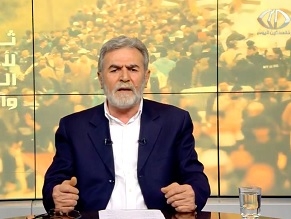|
Euroasian Jewish News

Then-Islamic Jihad Deputy Secretary-General Ziad Nakhaleh delivering a speech on August 14, 2018. (Screenshot: Palestine Today)
|
Islamic Jihad chief meets Russian FM, thanks him for criticism of US plan
12.03.2020, Russia An Islamic Jihad delegation led by the terror group’s secretary-general, Ziad Nakhaleh, met Russian Foreign Minister Sergey Lavrov on Wednesday in Moscow and thanked him for Russia’s critical view of the recently revealed US plan to resolve the Israeli-Palestinian conflict, according to the terror group’s website.
Nakhaleh’s meeting with Lavrov came after the Russian foreign minister hosted several other higher-ups of Palestinian groups in recent weeks, including Hamas chief Ismail Haniyeh, Fatah Central Committee member Hussein al-Sheikh and Palestinian National Initiative secretary-general Mustafa Barghouti.
“The Islamic Jihad movement expressed its appreciation for the Russian position in rejection of the deal of the century,” the terror group’s website said.
In early February, Kremlin spokesman Dmitry Peskov criticized the US plan, asserting that it contradicts many United Nations resolutions.
Breaking with past American administrations, US President Donald Trump’s plan envisions the creation of a Palestinian state in about 70 percent of the West Bank, a small handful of neighborhoods in East Jerusalem, most of the Gaza Strip and some areas of southern Israel — if the Palestinians recognize Israel as a Jewish state, disarm Hamas and other terror groups in the Gaza Strip, and fulfill other conditions.
The Trump plan also allows Israel to annex settlements, grants the Jewish state sovereignty over the Jordan Valley and overriding security control west of the Jordan River, and bars Palestinian refugees and their descendants from settling in Israel.
The Islamic Jihad delegation and Lavrov also discussed “internal Palestinian unity,” the terror group’s website added, noting further that the Russian minister “expressed Russia’s readiness to help in achieving” it.
Islamic Jihad, which is backed by Iran, has long sided with Hamas in its dispute with the Fatah.
Hamas has been at loggerheads with Fatah since it ousted the Fatah-dominated Palestinian Authority from Gaza in 2007. Multiple past attempts to reconcile Hamas and Fatah and unite the West Bank and Gaza under one government have failed.
Russia has previously made efforts to advance Palestinian national unity. In January 2018, Moscow hosted a number of representatives of several Palestinian factions to discuss mending the internal Palestinian rift.
Eli Belotserkovsky, the Israeli chargé d’affaires in Moscow, protested Lavrov’s meeting with the Nakhaleh to Mikhail Bogdanov, Russia’s deputy foreign minister and presidential Middle East envoy, on Thursday, Channel 13 reported.
Belotserkovsky told Bogdanov that Islamic Jihad “is an Iranian-backed terror group that does not recognize Israel’s right to exist and that systematically destabilizes the long-term ceasefire with the Gaza Strip by carrying out attacks against Israeli citizens.”
Israeli officials have frequently accused Islamic Jihad of undermining informal ceasefire understandings between Israel and Hamas by firing rockets at Israel or carrying out shooting or other attacks near the fence between Gaza and the Jewish state.
The understandings have largely entailed Israel lifting restrictions on the movement of goods and people into and out of Gaza, in exchange for Hamas maintaining relative quiet in the border region between the coastal enclave and the Jewish state.
By ADAM RASGON
The Times of Israel
|
|
